In this article:
Hyperpigmentation is a common skin disorder that does not pose any serious risk to your health. However, it can become a cosmetic concern, especially if it occurs on the face.
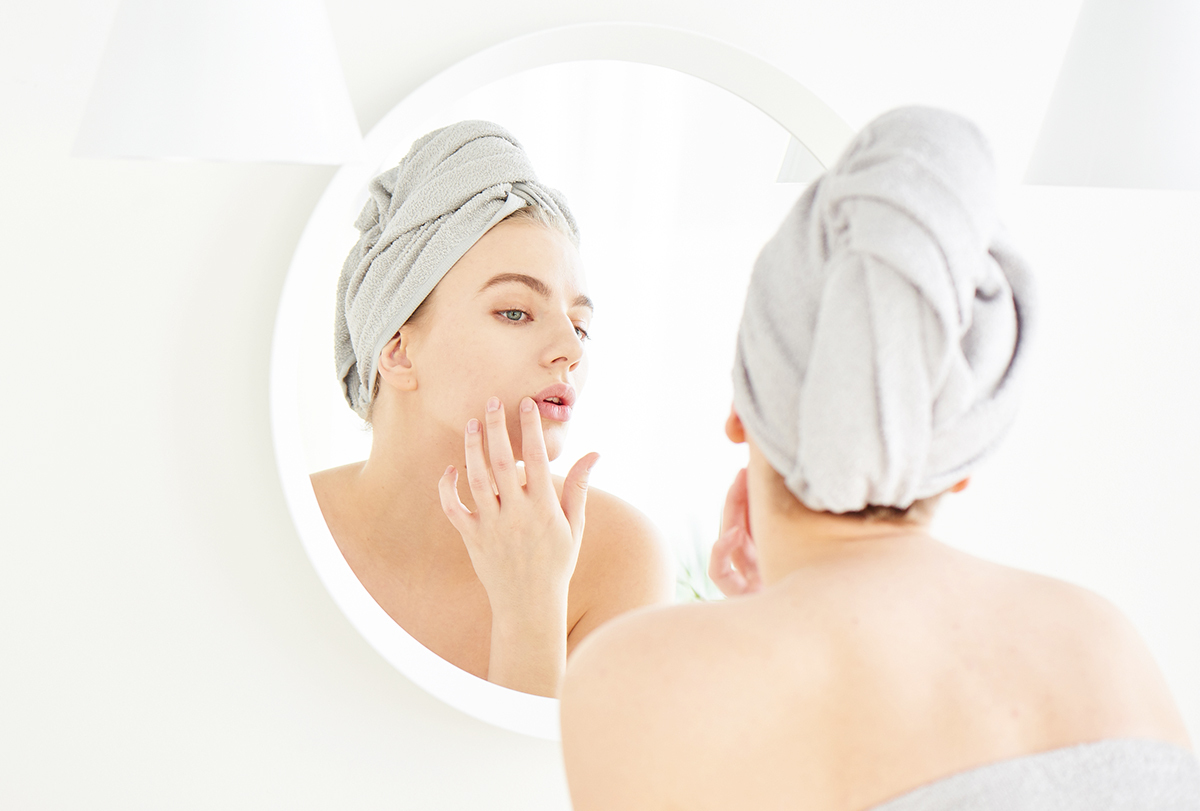
People often develop dark spots or patches on the face that can make them self-conscious about their appearance. Such negative feelings can hamper their confidence and feed psychological as well as emotional distress.
This article will focus on hyperpigmentation around the mouth and how to get rid of it. The good thing is several interventions can help fade this hyperpigmentation.
Does Exfoliation Remove Hyperpigmentation Around the Mouth?
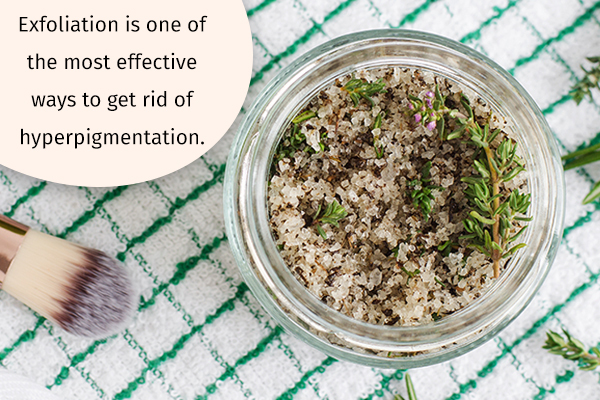
Exfoliation is one of the most effective ways to get rid of hyperpigmentation. Although your skin is a self-regenerating organ that sheds dead cells every day and makes new ones to replace them, it takes around a month for the entire outer layer of the skin to resurface in this manner.
The dead skin cells rise to the skin’s surface and are gradually shed in the environment. Meanwhile, new skin cells produced in the deeper layers rise to the surface to replace the lost cells.
Exfoliation can help loosen and remove the dead cells collected on the skin to speed up the skin resurfacing process. These hyperpigmented skin cells also get sloughed off in a similar manner and are replaced by new healthy skin cells that will inadvertently be of your natural complexion.
Plus, exfoliation clears out the impurities and extra sebum settled inside your skin pores for a deep clean. However, you have to be careful about the exfoliating agents you use on your sensitive facial skin. Some of the scrubs and chemical exfoliants available nowadays are too harsh for the skin and can sometimes end up damaging it further.
Fortunately, many natural or herbal ingredients can get the job done without causing any harm. (1) In fact, they may offer additional skin benefits to further aid the healing process.
Home Remedies to Reduce Hyperpigmentation Around the Mouth
1. Exfoliate with herbal ingredients
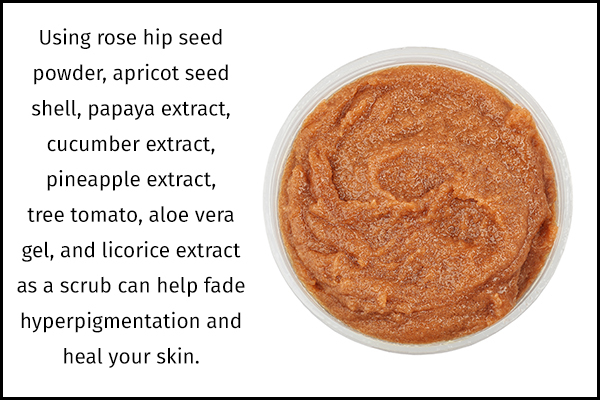
Rosehip seed powder, apricot seed shell, papaya extract, cucumber extract, pineapple extract, tree tomato, aloe vera gel, and licorice extract are all natural ingredients with different skin-healing abilities. Using them together as a scrub can help fade your hyperpigmentation and heal your skin. (1)
How to use:
- Mix all these ingredients with a little bit of rose water and milk to make a paste.
- Apply this paste to your face or just around your mouth, and wait for it to dry.
- Lightly scrub it off using lukewarm water.
2. Use an oatmeal scrub
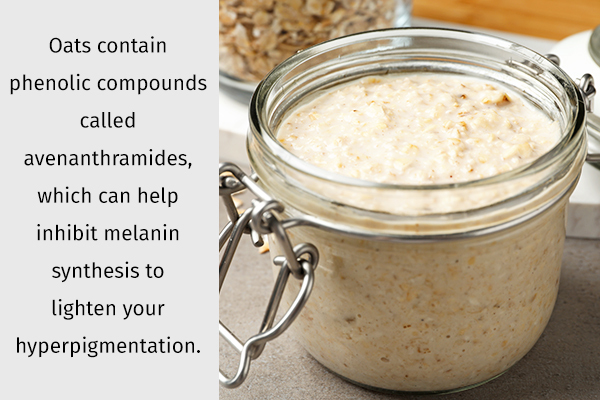
Oats contain phenolic compounds called avenanthramides, which can help inhibit melanin synthesis to lighten your hyperpigmentation. (2) Their granular texture provides gentle skin exfoliation, but unlike most exfoliating agents, oats are deeply hydrating as well.
How to use:
- Mix ½ tablespoon of oatmeal with 1 teaspoon of rose water.
- Apply this paste around the mouth or to your face and neck, and let it dry.
- Gently scrub it off with lukewarm water.
3. Try a mung bean scrub
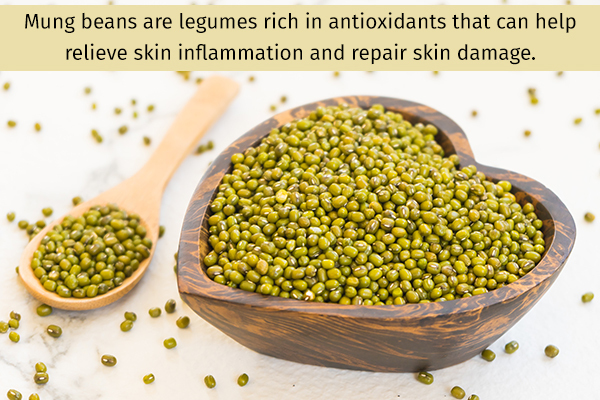
Mung beans are legumes rich in antioxidants that can help relieve skin inflammation and repair skin damage. They are also credited with skin-whitening effects.
Plus, these tiny granules help scrub the skin without damaging it, thus removing the dead cells, dirt, and excess sebum to reveal fresh new bright skin underneath. (3)
How to use:
Soak mung beans overnight.
- Make a paste by combining the soaked mung beans, rose water, and milk.
- Apply this paste to your face and around your mouth.
- Scrub it lightly using your fingertips and then wash it off with lukewarm water.
4. Prepare a turmeric paste
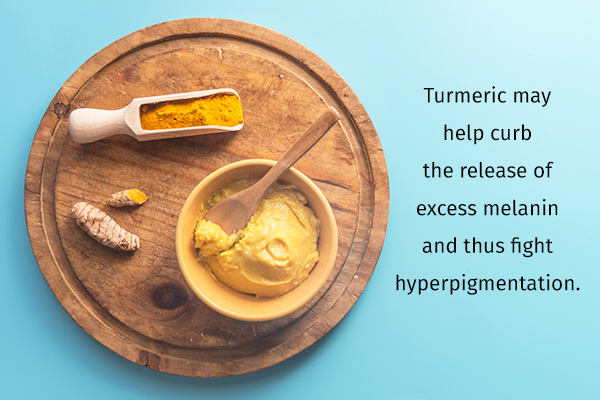
Turmeric may help curb the release of excess melanin and thus fight hyperpigmentation, in addition to other skin-healing properties. (4)
How to use:
- Take some turmeric powder in a bowl, and mix in a few drops of rose water to make a paste.
- Apply this mixture to the dark areas around your mouth.
- Leave it on for 10 minutes and then rinse it off with warm water.
Treatments to Reduce Hyperpigmentation Around the Mouth
The following treatment modalities can help reduce hyperpigmentation around the mouth.
1. Topical products
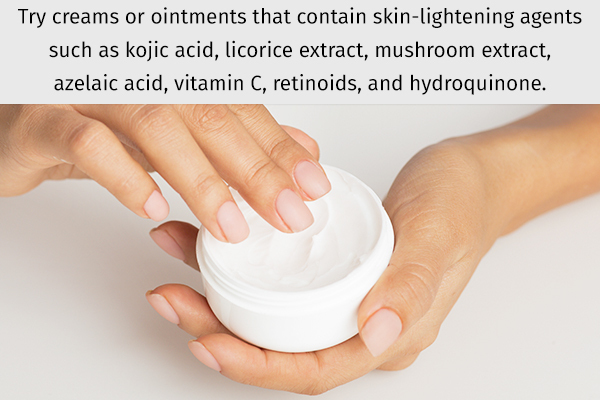
Try creams or ointments that contain skin-lightening agents such as kojic acid, licorice extract, mushroom extract, azelaic acid, vitamin C, (5) retinoids, and hydroquinone.
However, some of these compounds should only be used with a doctor’s prescription and direction. So, it’s best to consult your dermatologist before trying any topical treatment for hyperpigmentation.
You may be recommended a combination of these topical agents to clear out the dark patches/spots. These agents have been found to be more effective than monotherapy in some cases. (6)
Disclaimer: Hydroquinone is widely considered by dermatologists to be the gold-standard ingredient for lightening dark spots, but it is associated with some very serious side effects if used excessively. (7) For this reason, this medication is not easily available in some countries.
2. Chemical peels
Chemical peeling involves applying a chemical agent to your skin to loosen the dead cells settled on the surface so that they become easier to remove. This is followed by peeling or flaking of the outer skin, which gradually sheds and reveals bright new skin underneath.
There are now serums that contain a small concentration of chemical peeling agents such as glycolic acid, salicylic acid, alpha hydroxy acids (AHAs), and beta hydroxy acids (BHAs) that are safe to use at home.
However, for stubborn or deep hyperpigmentation, you may have to visit a dermatologist’s clinic for stronger chemical peels. The entire procedure usually involves multiple sessions.
3. Laser therapy
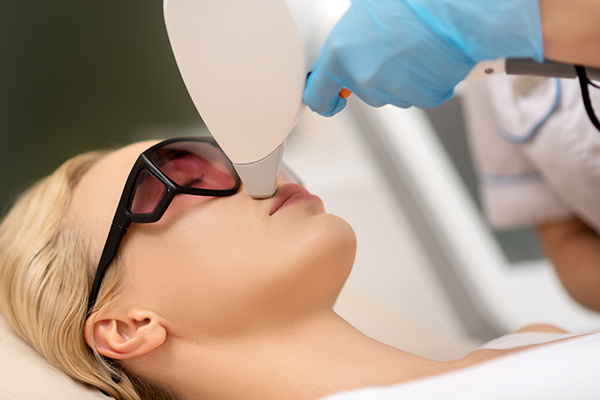
Laser therapy is a minimally invasive procedure wherein the doctor targets laser energy on the hyperpigmented area to destroy the damaged cells and excess melanin without affecting the surrounding tissue.
Diagnosing Hyperpigmentation
Hyperpigmentation falls within the purview of a primary care practitioner. The doctor will inquire about your medical history and any coinciding symptoms before moving on to a skin examination. A skin biopsy may be needed to rule out the melanoma and its precursors. (8)
Causes and Symptoms of Hyperpigmentation
Hyperpigmentation essentially means that your skin becomes darker in patches due to an overproduction of melanin (skin pigment) in those areas. It can be limited to small patches, affect larger areas, or encompass the whole body.
Melanin is produced by specialized cells called melanocytes found in the skin. Many external and biological factors can overstimulate these melanocytes into releasing excess melanin, which will make the overlying skin darker.
In some cases, these spots or patches may fade after a few days of skin care and avoiding the sun. In other cases, they may persist for longer and warrant a proper diagnosis by a healthcare professional. The doctor will trace the root cause of the problem and then treat it accordingly.
Here are some of the common factors that lead to hyperpigmentation around the mouth:
- Exposure to UV radiation through sunlight (9) or other artificial sources such as LED screens
- Hormonal changes or diseases triggered by them such as melasma, hemochromatosis, Addison’s disease, hyperthyroidism, chikungunya fever, and diabetic dermopathy, among others
- Inflammation, especially inflammatory skin disorders such as rosacea, psoriasis, eczema, and acne
- Injury
- Side effects of certain medications, including oral contraceptives, minocycline, and certain chemotherapy drugs
- Deficiency of certain vitamins such as vitamin B12 (10) and vitamin D (11)
- Smoking
- Obesity
- Seborrheic melanosis or fungal infections
Things to Keep in Mind When Exfoliating the Skin Around the Mouth
- Always patch-test any new topical remedy to rule out any adverse or allergic reactions; the same rule applies to these natural scrubs.
- Don’t rub the scrub with force as it can end up irritating, damaging, and loosening your delicate facial skin. Instead, dab it on the face and gently massage it with light fingers.
- Don’t use hot water to wash your face as it strips the moisture from your skin, leaving it utterly dry. Instead, use lukewarm or cool water to rinse the scrub off your face.
- Exfoliation leaves your skin slightly sensitive, so it’s highly recommended to do it in the evening when you don’t have to face the sun. Plus, skin repair mostly happens at night, so the ideal time for exfoliation is before going to bed.
- Don’t scrub around the eyes as the skin in that area is extremely thin and can easily get damaged or irritated.
- Exfoliation ends up removing some of the natural lipids from your skin and may leave it a bit dry. So, always apply a good moisturizer to restore the lost moisture to your skin. (1)
Preventing Hyperpigmentation Around the Mouth
By knowing the cause of hyperpigmentation around your mouth, you can treat it properly. Also, prevention is better than cure.
As excessive sun exposure is also one of the main causes of hyperpigmentation, you should do the following preventive measures:
1. Limit sun exposure

Sunlight contains UV rays that go deep into the skin and cause cellular damage. But the melanin in the skin acts as a barrier against this onslaught. It absorbs the UV rays at the epidermal layer and prevents them from penetrating further.
As soon as sunlight falls on your skin, it activates the melanocytes in that area to secrete more melanin. Although this self-defense mechanism protects the skin from UV damage, it also ends up making the exposed area darker due to melanin buildup.
Thus, it is very important to shield your skin from the sun if you wish to avoid or reduce hyperpigmentation. (9)(12) Try not to go out when the sun is at its peak. Instead, plan your trips early in the morning, late in the afternoon, or after sunset.
2. Exercise proper sun protection
You must apply a broad-spectrum sunscreen with an SPF of 30 or higher to all exposed areas of your body. Make this part of your morning ritual, and do this even if you are staying indoors because sunlight can find its way to you through windows.
Preferably look for sunscreens that have additional sun blockers such as titanium dioxide or zinc oxide. If you are staying out for long, make sure to reapply the sunscreen after 2 hours as it tends to wear off.
Moreover, wear full-sleeved tops, full-length pants, and socks, as well as scarves and wide hats, to keep the sunlight away from your skin.
3. Don’t pick or scratch at your skin/lesions/acne
Any kind of physical damage or trauma to the skin can trigger inflammation in the area. Inflammation can then stimulate the melanocytes to produce excess melanin, resulting in dark patches, spots, or scars.
Final Word
Despite the availability of multiple medications and clinical procedures for hyperpigmentation around the mouth, it continues to be challenging to treat most of the time.
This is mainly because identifying the root cause of the hyperpigmentation from a wide variety of probable causes is difficult. Plus, the drugs and active agents used to reduce hyperpigmentation may come with deleterious side effects that deter patients and dermatologists from using and prescribing them. (6)
Besides the standard medical treatment, many natural ingredients have gained popularity as topical remedies for hyperpigmentation. (13) You can experiment with these, but only after conducting a patch test.
If proper skin care and home treatment do not yield desired results or if your condition worsens over time, consult a dermatologist right away for a proper medical evaluation and treatment.
- Was this article helpful?
- YES, THANKS!NOT REALLY


